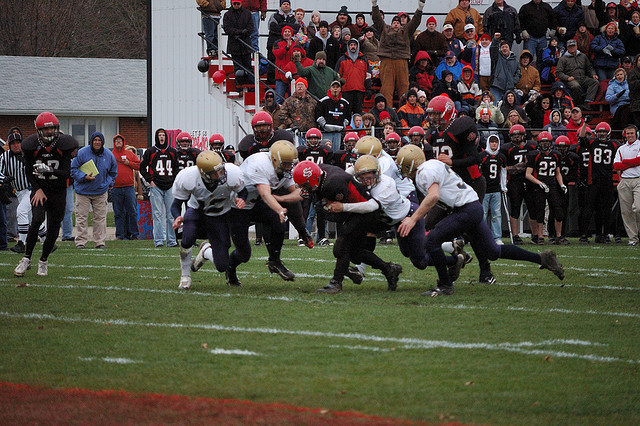
The NFL has seen its product blasted over the year for how it has dealt with concussions. It all stemmed from players such as former Chargers linebacker Junior Seau, who committed suicide after suffering from chronic traumatic encephalopathy (CTE).
A slew of former players have been diagnosed with CTE, including former NFL running back Tony Dorsett. On ESPN, Dorsett told them “when he took his Oct. 21 flight from Dallas to Los Angeles, he repeatedly struggled to remember why he was aboard the plane where he was going.”
That’s scary.
Last year, the NFL agreed to pay $765 million in a settlement over the issue, and on the field it has begun to penalize players for targeting the head.
The league could be seeing major repercussions over the years, with fewer and fewer players joining Pop Warner, which saw a 9.5 percent drop in participants. In total, it lost 23,612 players in 2012 (via OTL on ESPN). That’s a huge drop off, and it’s something that could lead to high school players opting out of football and participating in something else.
So the question now is, will parents let their kids play football? In an interview with the New Yorker, President Barack Obama was asked this very question.
“I would not let my son play pro football,” President Obama said.
And one could certainly suggest that he would strongly think about not letting his son play any sort of football. I wouldn’t.
High School football has 11.2 concussions for every 10,000 games. The number drops as you move into college football to 6.3, according to PBS.
That is an alarming number considering the affects concussions could have over the years. It’s even more alarming to hear that helmets, no matter the brand, can’t stop a player from receiving a concussion.

“[Helmets] are more protective when it comes to skull fractures…they do not in any way, shape or form, have any relevance to concussions whatsoever. All the helmets are designed for fractures. It doesn’t matter what helmet you have they offer the same protection, “ said Dave Ferguson, a nationally known sports analyst on concussions.
When I asked Ferguson if what he was saying suggested that helmets won’t necessarily protect you from the effects of concussions, he said “Correct.”
So what happens when you have a concussion?
WebMD says that a concussion is a “type of traumatic brain injury that is caused by a blow to the head or body, a fall, or another injury that jars or shakes the brain inside the skull. It continues to say, “you don’t have to pass out to have a concussion,” and “there may be no other visible signs of a brain injury.”
Basically, a concussion could happen even if you don’t hit your head.
And when it happens, memory loss could occur.
Will Rosario played six years of football between high school and semi-pro, and remembers having a concussion.
“It was quick. It was a minor concussion but I knew I had one and continued to play. I was dazed and forgot what happened right before I hit my head, then I had a ringing in my ear.”
He witnessed as teammates were lying knocked out on the ground.
“I’ve seen teammates that were completely out of it and the trainer diagnosed them [with a concussion]. They took their helmet for the day.”
Concussions can lead to long-term effects, including memory loss. But it also has effects that should be an eye-opener of parents who have kids in football.
WebMD says, “Repeated concussions or a severe concussion may require surgery or lead to long-lasting problems with movement, learning, or speaking.”
Education is crucial to a high school players’ long-term educational goal, so a concussion affecting a student’s ability to learn can be devastating.
It is something to think about when you send your kids to play football. Any tackle could lead to a concussion, and could lead to the possibility of a student not being able to learn.
What could be done to prevent concussions? Well, nothing. But with the right laws (league wise and state wise), students could be better protected from a concussion.
The NFL is doing what it can to prevent them after the scathing lawsuit from former football players. But what are states doing anything?
Sen. Dick Durbin (D) introduced legislation called the Protection of Student Athletes from Concussions Act in 2013. The bill has received support from the NFL, NBA, MLB, U.S. Soccer, NCAA, and USA Football.”
From Think Progress:
“The legislation would direct states to ‘develop concussion safety guidelines for public school districts that include posting educational information on school grounds and school websites about concussion symptoms, risks and recommended responses for student athletes, parents, coaches and school officials.’ It would also mandate policies that require athletes suspected of suffering concussions sit out of practice or games for the rest of the day, a standard recommended by numerous sports medicine and neurological associations.”
Unfortunately, according to Congress.gov the bill has yet to be passed. The legislation was referred to the House Committee of Education on Nov., 11, 2013, but it hasn’t moved since.

In Illinois, the Illinois High School Association (IHSA), passed protocol to help with the concussion issue.
“Any athlete who exhibits signs, symptoms or behaviors consistent with a concussion (such as loss of consciousness, headache, dizziness, confusion, or balance problems) shall be immediately removed from the contest and shall not return to play until cleared by an appropriate health care professional.”
“Parents need to be aware, coaching staffs need to be aware on how to deal with concussions. Certainly return to play guidelines need to be in place in [all levels], Ferguson said. “They need to make sure that these players are not putting themselves at risk putting themselves back in the game after they suffered one concussive incident and making sure that they are healed completed, and not relying upon the judgment of the player, but the medical staff that are trained in how to deal with concussions.”
The problem is, in Rosario’s case, the coaches or staffs weren’t told about the symptoms, and that is the challenge a lot of coaches will face. Will they be able to convince players to be honest with them and talk to them about possible symptoms? There are players that won’t talk about it.

Seahawks Pro-Bowl cornerback Richard Sherman wrote on MMQB.com about the very issue.
“I couldn’t see. The concussion blurred my vision and I played the next two quarters half-blind, but there was no way I was coming off the field with so much at state,” Sherman said.
And the next time he suffers a concussion; Sherman will “get back up and pretend like nothing happen.”
And that is a challenge all coaches will have to face.
So should you allow your kids to play football?
Like I said earlier, I wouldn’t. President Obama wouldn’t.
But it’s not about what I think; it’s what my future kids will think. I will make sure that they are well versed on the problems concussions could affect them in the future, but if they still decide to play football then I will support them the entire way.
Rosario said, “With my son I would have him only play football after he is about 13 or 14, just for the safety side of things. I think if they want to then I will let them and make sure they play it safely.”
When asked if he knew about the concussion issue when his kids were younger, and if he did, would he let his kids play the more physical sports such as football, Ferguson said, “Yes, I would…As a parent putting your child in a sports that have the risk…of a concussive incident occurring is to be aware of all the signs and symptoms; to be educated about it in order to deal with the possibly of an event occurring.”
There are no solutions to the concussion problem, but it pays to be open and honest, and being well educated on the problem. Football players will be football players, and you can’t stop kids from chasing their dream.











Be First to Comment